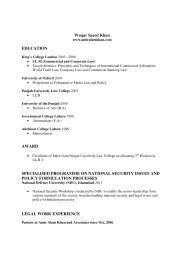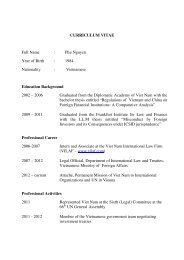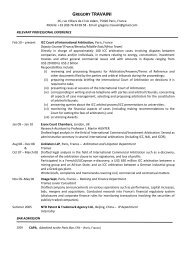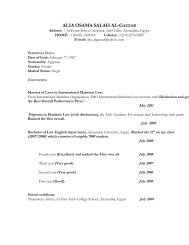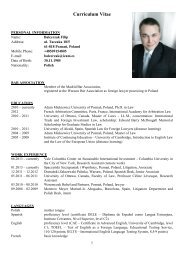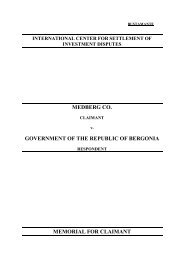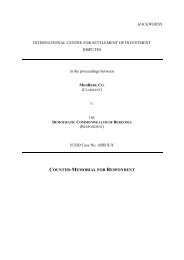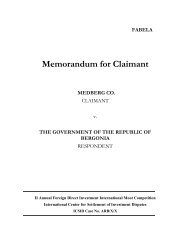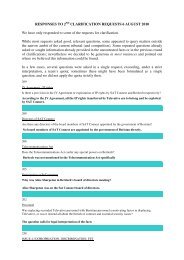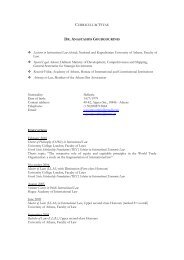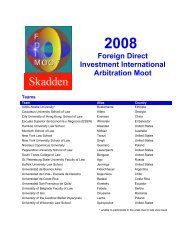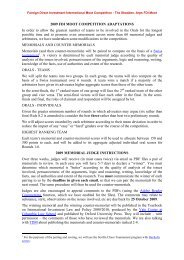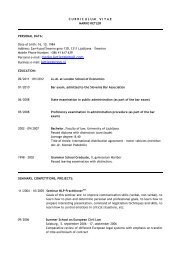memorial for respondent team ago fifth annual foreign ... - FDI Moot
memorial for respondent team ago fifth annual foreign ... - FDI Moot
memorial for respondent team ago fifth annual foreign ... - FDI Moot
You also want an ePaper? Increase the reach of your titles
YUMPU automatically turns print PDFs into web optimized ePapers that Google loves.
IV. REGARDLESS, THE AWARD SHOULD BE UPHELD BECAUSE THE TRIBUNAL DID NOT<br />
HAVE JURISDICTION TO HEAR THE MAX SOLUTIONS-BELA RANO DISPUTE.<br />
48. The Award should be upheld, because the Tribunal correctly determined that it<br />
could not hear the merits of a dispute over which it had no jurisdiction.<br />
49. There are two widely accepted theories regarding when a tribunal has jurisdiction<br />
to hear an investment treaty dispute. A decision based on one faction’s interpretation of the<br />
law does not constitute a manifest excess of power. Further, it is not the role of the<br />
Annulment Committee to apply its own interpretation of the law; it is simply to ensure that<br />
the “manner in which the Tribunal approached” the Award was appropriate. 85<br />
50. The Award should only be annulled if the Tribunal manifestly exceeded its<br />
powers under Article 52(1)(b) of the ICSID Convention. The standard of review <strong>for</strong><br />
decisions on jurisdiction are the same as <strong>for</strong> any other subject matter. 86 In particular, when<br />
jurisdiction is at issue, the applicant carries a “heavy burden” to establish that there has<br />
been a manifest excess of power. 87 Since the Tribunal’s interpretation was reasonable and<br />
since the Annulment Committee confers “special weight to the Arbitral Tribunal’s<br />
interpretation of the jurisdictional instrument,” 88 the Award must be upheld as the Tribunal<br />
did not manifestly exceed its powers by applying a widely accepted approach to the law.<br />
51. One of the two widely accepted theories provides that the investment must only<br />
satisfy Article 25 of the ICSID Convention <strong>for</strong> jurisdiction to exist. 89 The other theory<br />
states that an investment must satisfy a “double-barreled test.” 90 The double-barreled test<br />
requires that the investment at issue be an investment not only according to Article 25 of<br />
the ICSID Convention, but also according to the applicable BIT. The Tribunal took the<br />
latter approach. 91 Since both parts of the test had to be independently satisfied and the<br />
Tribunal determined that the transaction at issue in the underlying arbitration was not an<br />
85<br />
Lucchetti, para. 97; see also CMS Annulment Decision, para. 136; MTD, para. 54.<br />
86<br />
MCI, para. 55.<br />
87<br />
Fraport II, para. 45.<br />
88<br />
Id. at para. 44.<br />
89<br />
See e.g. Joy Mining, para. 50; Mitchell, para. 31; Mobil, para. 156.<br />
90<br />
See e.g. Jan de Nul, para. 90; Malicorp, para. 107; El Paso, para. 142; Global Trading, para. 43.<br />
91 Award, 16:794-797.<br />
18



